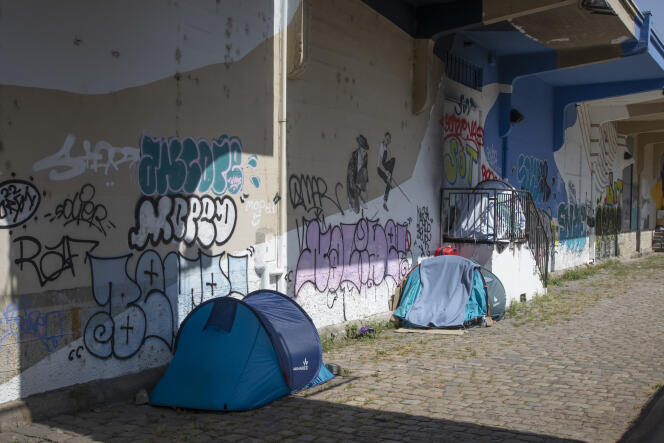

For Paris's homeless, the isolation gets worse in summer: 'I can't wait to see familiar faces again'

"[Getting] food in August is complicated: A lot of associations close down," said Ibrahim, in his 40s, whose appearance – thin beard, T-shirt and striped shirt open over light jeans – does not make him appear homeless. (People cited by their first names only wished not to give their surname.) "It's also harder to beg because there are more people doing it," he said, at the same time as expressing his regret at having to do it, since his rights to welfare benefits have been suspended.
"I prefer winter to summer," said Sacha, 16, blue-eyed and pierced, who asks passers-by for change alongside his companion, Lapo, a 23-year-old from Italy, and his dog, Votane. "When it's cold, you can cover up. Here, you can't uncover yourself. And then, in winter, it's quieter. People are less in a hurry and nicer, and they give a little more."
Ibrahim has been living on the streets of Paris for two years, and Sacha and Lapo have been camping out in the gardens around Les Halles for a few days, after being evicted from the Bois de Vincennes by police officers. The City of Lights has the highest number of homeless people in France – 3,015 were counted during the sixth edition of the Night of Solidarity, organized on January 26 by the city council. But it also has the most facilities to help them: night shelters and social hotels, free public showers, day centers and other places to have a coffee, eat, wash clothes, leave luggage during the day or meet social workers, not forgetting the outreach teams who come to meet those who don't move around.
Even in a year when the Paris region was spared a heatwave, the summer period is far from easy. "When you're constantly on the streets, there's never any rest," said Ibrahim.
"There are fewer structures open in summer, even if the situation is improving," said Lotfi Ouanezar, general manager of Emmaüs Solidarité. For a month, the organization served hot meals in the evening in the refectory of the Hôtel de Ville, and organized lunches at the Porte de la Villette, with funding from the Paris Mayor's office. "We wanted to compensate for the closure of the Restos du Cœur [a food charity] for part of the summer, due to a lack of volunteers and the cost of foodstuffs, which has risen with inflation," said Léa Filoche, deputy minister for solidarity for Paris Mayor Anne Hidalgo (Socialist).
While the need was estimated at 250 dinners a day, the number of diners has grown steadily. Some 370 people savored the vegetable stew and turmeric-scented rice prepared on August 22 by the association Refugee Food, just before the end of the program. Among them was 40-something Ibrahim, who wanted to "say bravo to all those who are helping us," and, a few tables away, Abdou and Mohammed. These Moroccans, aged 22 and 26, were just finishing their only meal of the day.
You have 61.35% of this article left to read. The rest is for subscribers only.
